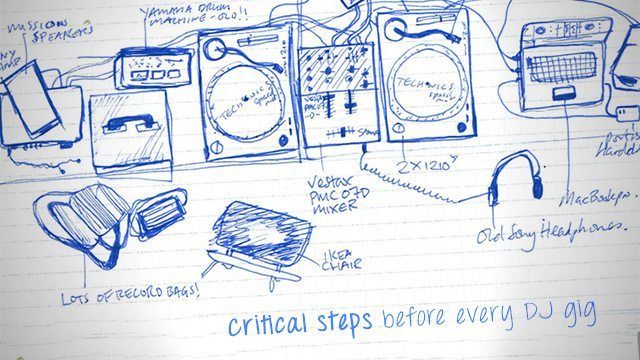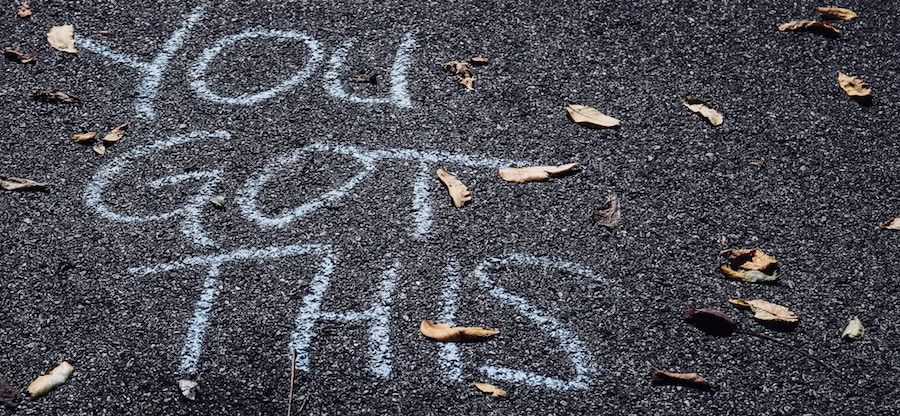The almost-universal sign of a DJ is doing a great job is a full dance floor – but how do you tell if a DJ is messing up? “Shoes in the dryer” beat matching slip ups, a track suddenly stopping, or people leaving the dance floor might all be hints at something not being right, but most people won’t notice if these performance problems are momentary.
The real universal way to tell that a DJ is screwing up is if, as an event attendee, you look at the DJ and they look like something is wrong. I recently saw a DJ refer to this as “mistake face”. It’s that face a performer makes when they mess up, feel out of control of the situation, or simply out of their element. With preparation and practice, almost anyone can avoid mistake face entirely.
when you put yourself in performance situations regularly, you start to grow comfortable with that feeling of pre- or during-show nerves
Every DJ (and performer of any type) feels nervous or unconfident occasionally. But when you put yourself in performance situations regularly, you start to grow comfortable with that feeling of pre- or during-show nerves. That’s why one of the best things that an early career DJ can do for themselves is play gigs regularly, even if they’re simple bar nights, live streamed mix shows, or other “small” events that put you in a live situation. (This also helps to build the most important DJ skill: reading a crowd/dance floor.)
In this article, I’m sharing a bunch of tips for feeling more confident when approaching a DJ set. Keep reading for preparation tips, mindset hacks, physical self-reflections, and how to screw up with style.
Confidence in Prep

Going into a DJ gig feeling good is almost entirely based on how we’ll you’ve prepared for it. This doesn’t mean you’ve got every single track and mix planned out – instead, it means having an arsenal of well-sorted music, the right gear, knowing what the night and venue will feel like, having an idea of who the crowd will be, and more.
Preparation is about being ready for the things you can control:
- Knowing what type of music will probably work well – and building a “must play” playlist for every specific gig. Read this article on common mobile DJ gigs and what music often works best if you need a starting point.
- Being familiar with the venue and DJ booth – make sure that there are no surprises in terms of the cables you might need, the gear that will be used, and the physical environment. Scout it out beforehand!
- Knowing other people who are a part of the event. This makes all the difference in feeling confident – if you know the other DJs, the promoter, the club owners, security staff, bartenders, event planners, or even just a few people who are attending, it can have a huge impact.
- Showing up early. I’ve seen far too many DJs show up “just in time” for their DJ sets, and while that might be fashionable, it’s stupid. A good DJ should have some context for how the crowd and venue has evolved over the night, and be able to understand what their role will be in the night.
- This tip goes for mobile DJs too – giving yourself extra time to set up your gear and test everything is critical. If you’re not billing your clients for setup/breakdown time, you’re doing it wrong.
- Having backups and failsafes: To be ready for a disaster, you need a plan. Having a plan means you don’t have to troubleshoot and panic if something goes wrong.
As a DJ, this means having the ability to quickly recover if any element of your setup fails. This can be as extensive as having a second laptop, or as simple as having a second thumbdrive. Read this article on what to do if your DJ controller dies entirely at a gig.
The Art of Prep: 5 Principles Every DJ Should Know
5 Mistakes New Club DJs Make
Critical Steps Before Every DJ Gig
Outwardly Projecting Confidence
This is where that idea of “mistake face” comes in. A big part of how well you’re doing as a DJ is reflected in your own actions – your body language, how you react to problems, and your demeanor. If you look uncomfortable, others will feel uncomfortable. This doesn’t mean you need to be grinning ear-to-ear every time you play a DJ set – looking confident isn’t the same as looking happy.
I have two pieces of advice for how any type of performer can outwardly project confidence:
First, watch other DJs perform who do a great job of showing their confidence and mimic their demeanour. There’s loads of content on the web to pull inspiration from – I find Nina Kraviz to be an amazing role model in this domain. She clearly enjoys her selections and has a good time mixing, but doesn’t need Armin-scale body language (heart hands and Jesus poses) to communicate that.
Second, record yourself DJing from the crowd perspective and watch your entire set. Yes, this might feel painful, but you’ll learn a lot about yourself in the process. Actors and dancers do this all the time when they are rehearsing to better understand how their own onstage actions translate to the audience, and it’s an easy way to discover things that you otherwise would have no idea about.
Confidence in Mindset + How To Screw Up At A DJ Gig

A core part of confidence is mental. Psyching yourself up for a gig is a great way to feel good. This can be as simple as words of self-affirmation (“you’ve got this”, “We’re gonna crush it tonight”, etc).
Keeping a healthy perspective on the gig and not over-thinking it is just as important. Any nerves or anxiety are likely to come mostly before or at the beginning of a DJ set. In most DJing environments, people are there to dance and enjoy themselves. Once the music starts playing, everything gets easier from a nerves standpoint.
Don’t be your worst enemy; have a short memory! Trust that you can do the job, and if something goes wrong, learn from it and move on.
You’ll have gigs where things go wrong. It will happen – but don’t spend a lot of time dwelling on these mistakes. The key is that you take those moments where things go wrong and you learn from them. In baseball, there’s a common quality that professional pitchers hope to have: “short-term memory”. In an interview on Medium, 20-year Major League Baseball pitcher Jim Mecir does a great job of summarizing why this is so important:
I looked back at my time with the Yankees, and I realized that my inability to forget my failures and move forward hindered my performance. I was too afraid of failing and losing my spot on the team.
Here is how I developed short term memory on the mound:
- I learned to concentrate on every pitch and forget about the preceding one. When the next batter stepped up to the plate, the slate was clean.
- If I had a bad outing I would take time after the game to figure out what went wrong and correct it for the next outing.
- Then I let it go and didn’t give it another thought.
Bonus Tip For Introverts (via Reddit)
On Booze + Other Adulterants
We are not here to preach about what types of substances DJs should and shouldn’t imbibe, but it’s important to remember that even if a quick shot of tequila or a few beers might seem to increase your confidence level, it comes with costs.
- dependence – you start to think/believe that you’ll only perform well if you have that drink
- impairment – this is a bit of a double-edged sword, because at first being a little tipsy might make you more willing to take chances and try new things, but with the side effect of reducing your reaction time, coordination (say goodbye to your precision fader movements), and balance
- sleepiness – alcohol is a depressant, so as you drink, you’ll get more tired. For DJs playing long sets or with late start times, this can be incredibly frustrating and take the fun out of a gig
I really enjoy having a few drinks and mixing with friends, but make sure that you’re drinking for your own enjoyment and not building a dependency around performance.
Have your own tips for being a more confident DJ?
Share your tips and advice in the comments and we’ll feature the best ones.





